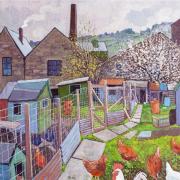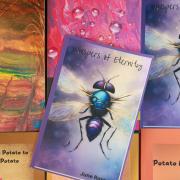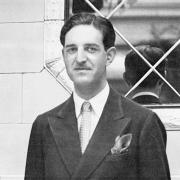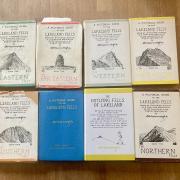Author Caroline Scott honours the worthy women who would fully ‘do their bit’ with spade, saw and plough to win the war.

‘You will do the straight, honest, and pure-minded thing, and be worthy of the name of Englishwomen.’
The words, spoken in 1918, came from Meriel Talbot, head of the Women’s Land Army, and were addressed to a combined meeting of the organisation’s Lancashire, Cheshire and Westmorland members.
Talbot told them the country was looking to them ‘as much as the men in the trenches’ for winning the war. But, she said, although they were dressed rather like men, they should remember that they were women.
There was a long history of women being employed on the land in Lancashire and the Lake District. They had worked both as farm maids – combining housework with dairy duties and caring for livestock – and as harvest labour. But in the last quarter of the 19th century women had been leaving the land. Employment as a domestic servant in town, or a mill worker, or a shop girl offered greater variety, more freedom and better pay.
Through 1915 the Lancashire Committee for Promoting the Employment of Women in Agriculture, presided over by Lady Derby, campaigned to encourage women ‘back to the land.’ However, they would prove reluctant to return to the conditions known by their grandmothers, and there was much temptation in the higher wages offered in munitions factories. Moreover, it wasn’t easy to persuade farmers to exchange their skilled men for inexperienced women. While 1,000 women had volunteered in Lancashire by April 1916, only 100 vacancies had been filled.
But agriculture’s need would become more urgent. A real labour shortage was starting to impact farm productivity by the spring of 1917, just as Germany’s U-boat campaign was shifting up a gear and threatening to starve Britain into surrender. It was this crisis that prompted the launch of the Women’s Land Army (WLA) in March 1917. Notices placed in newspapers appealed for ‘10,000 Women Wanted at Once to Grow and Harvest the Victory Crops.’ In April 1917 candidates began to be interviewed by selection boards in Preston, Lancaster and Ulverston. The Lancashire County Committee reported that ‘they were particularly gratified by the type of women who have offered themselves’.

The roles that these new recruits took on were very varied. For example, of 35 women trained in Carlisle in the spring of 1918, five gained situations in forestry, six in forage work, four in market gardening, and the remainder in a range of field work. In the summer they would be haymaking, then later lifting potatoes and in the autumn picking damsons in Westmorland. And all of that hard graft was rewarded with a change in farmers’ attitudes. In 1918 James Hamilton, who farmed at Old Garswood, Wigan, said: ‘A short time ago I would not have thought it was possible for women to do the work they were doing on the land.’ He had women learning to plough with a tractor.
When the German army launched its spring offensive in 1918 there was a renewed call for army reinforcements. More men would leave the land, and more women would be required to take their places. There was a particular push in the north, with the recruitment campaign in Lancashire and Cumbria aiming to sign up 30,000 volunteers. Four recruiting stations were opened in Liverpool and a recruiting tram toured the suburbs. ‘Play up, Liverpool!’ urged adverts placed in the local press. Members of the WLA marched through Manchester carrying banners bearing the legend ‘We Are All Fit’. The Manchester Evening News observed: ‘The hefty representatives of the Land Army, clad in breeches and smocks looked particularly well. Some carried rakes, hoes, double-handles saws, and other implements used on the land, and the young lady who placidly sat among the pigs in the high-sided cart came in for a large share of attention.’
In the spring of 1918 there were 800 members of the Land Army working in Lancashire. But, in addition to the uniformed Land Girls, a Board of Agriculture report counted some 2,187 local women working full-time on farms and another 2,421 part-time. And that report also noted: ‘A special word of praise should be recorded to the farmers’ wives of Lancashire, who are doing noble work. They are astir at sunrise, and are at work long after dark.’ The Land Army was just a small part of the whole female agricultural labour force then, but their significance, in encouraging other women to come back to the land, and winning farmers’ acceptance, was greater than the sum of their numbers.
Although the work was often dirty, heavy and tiring, many would also find a sense of purpose and pleasure in it – and excel in their roles. In 1919 55 members of the WLA were recognised for their exceptional achievements with the presentation of a Distinguished Service Bar. One of the recipients was Miss F. Bridgman, a Lancashire woman, who ‘by her strenuous efforts for 16 months had a weekly tractor average just double that of the men, and on one occasion she risked her life to deal with a tractor that was out of control on a hill.’ Miss D. C. McCrae was awarded for ploughing land in Cumberland which ‘some soldier workers had refused to touch.’ The award ceremony in London was hosted by Princess Mary, and followed by a supper and concert ‘at which two Land Army girls sang and several girls from Cumberland danced old country dances while one of their number played a mouth organ.’
As the centenary of the Land Army’s formation is marked this year, it’s timely to remember the contribution of the north’s female farm workers to the war effort.

My Rochdale roots
As the centenary of the start of the First World War approached, like so many other people, I was inspired to begin researching how the conflict affected my own family. My great-grandmother was 21 in 1914 and living on the family farm in North Middleton, Rochdale. When her elder brother left for the Manchester Regiment in 1916, it then fell to his sisters to keep the farm going. I was interested in how they coped, what challenges they faced and how typical this experience was. My book, Holding the Home Front, is the result of trying to put my own family’s story into context.
Published by Pen & Sword Books and available online for £11.99



























